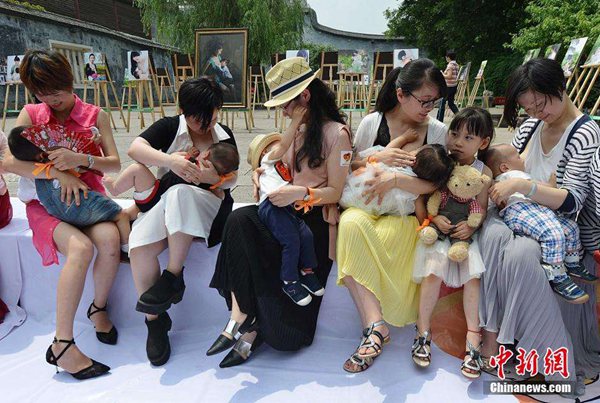


China is facing a severe decline in breastfeeding. Statistics show that the proportion of pure breastfeeding among infants under 6 months dropped to 20.8 per cent in 2013 from 27.8 per cent in 2008, much lower than the world average of 38 per cent.
August 1 to 7 marked the annual World Breastfeeding Week, and “Sustaining breastfeeding together” was the theme of the event. 76.83 per cent of Chinese mothers returning to work after maternity leave choose to breastfeed their babies, but only 28 per cent of them are able to keep the practice, said Cao Bin, deputy inspector of the Department of Maternal and Child Health under China’s National Health and Family Planning Commission. He spoke at a breastfeeding forum on July 31.
The ultimate goal set by the Outline for Chinese Children Development (2011–2020) is to achieve a breastfeeding rate of 50 per cent. In this regard, China still has a long way to go.
According to Gao Yixing, a program officer of the Bill and Melinda Gates Foundation, Chinese mothers’ choice of breastfeeding is influenced by multiple reasons such as society, environment, work and personal factors. “Sale of milk powders is surging while the breastfeeding rate is declining in the country,” Gao said, adding this is why the foundation promotes breastfeeding in the country.
Death rate from diarrhea and respiratory tract infections, as well as the incidence of necrotizing enterocolitis are higher among infants who have not been breastfed for at least 6 months, said associate researcher Zhang Shuxi of the Capital Institute of Pediatrics.
However, many Chinese parents are not aware of the fact and would easily replace breast milk with formula milk. “We should not blame the mothers as responsibility is on the society,” Zhang noted.
After China’s first breast milk bank was established in Guangzhou 4 years ago, 17 more banks have been created across the country. However, breast milk banks are still new in the country and lack universal standards and monitoring systems. Besides, donation and capital shortages are also challenges for these milk banks.
In addition, the wide promotion of formula milk has also contributed to the decline in breastfeeding. Over the last 20 years, milk powder manufacturers have been cracking their brains to expand their business in the country through sales, advertisements, clubs and public service activities.
However, the current legal construction in this regard is not able to keep up with the rapid development of milk powder market. “Though China has done a great job in popularizing breastfeeding in recent years, the promotion of breast milk substitutes has not been effectively contained,” said an anonymous expert.
 Fire brigade in Shanghai holds group wedding
Fire brigade in Shanghai holds group wedding Tourists enjoy ice sculptures in Datan Town, north China
Tourists enjoy ice sculptures in Datan Town, north China Sunset scenery of Dayan Pagoda in Xi'an
Sunset scenery of Dayan Pagoda in Xi'an Tourists have fun at scenic spot in Nanlong Town, NW China
Tourists have fun at scenic spot in Nanlong Town, NW China Harbin attracts tourists by making best use of ice in winter
Harbin attracts tourists by making best use of ice in winter In pics: FIS Alpine Ski Women's World Cup Slalom
In pics: FIS Alpine Ski Women's World Cup Slalom Black-necked cranes rest at reservoir in Lhunzhub County, Lhasa
Black-necked cranes rest at reservoir in Lhunzhub County, Lhasa China's FAST telescope will be available to foreign scientists in April
China's FAST telescope will be available to foreign scientists in April "She power" plays indispensable role in poverty alleviation
"She power" plays indispensable role in poverty alleviation Top 10 world news events of People's Daily in 2020
Top 10 world news events of People's Daily in 2020 Top 10 China news events of People's Daily in 2020
Top 10 China news events of People's Daily in 2020 Top 10 media buzzwords of 2020
Top 10 media buzzwords of 2020 Year-ender:10 major tourism stories of 2020
Year-ender:10 major tourism stories of 2020 No interference in Venezuelan issues
No interference in Venezuelan issues
 Biz prepares for trade spat
Biz prepares for trade spat
 Broadcasting Continent
Broadcasting Continent Australia wins Chinese CEOs as US loses
Australia wins Chinese CEOs as US loses